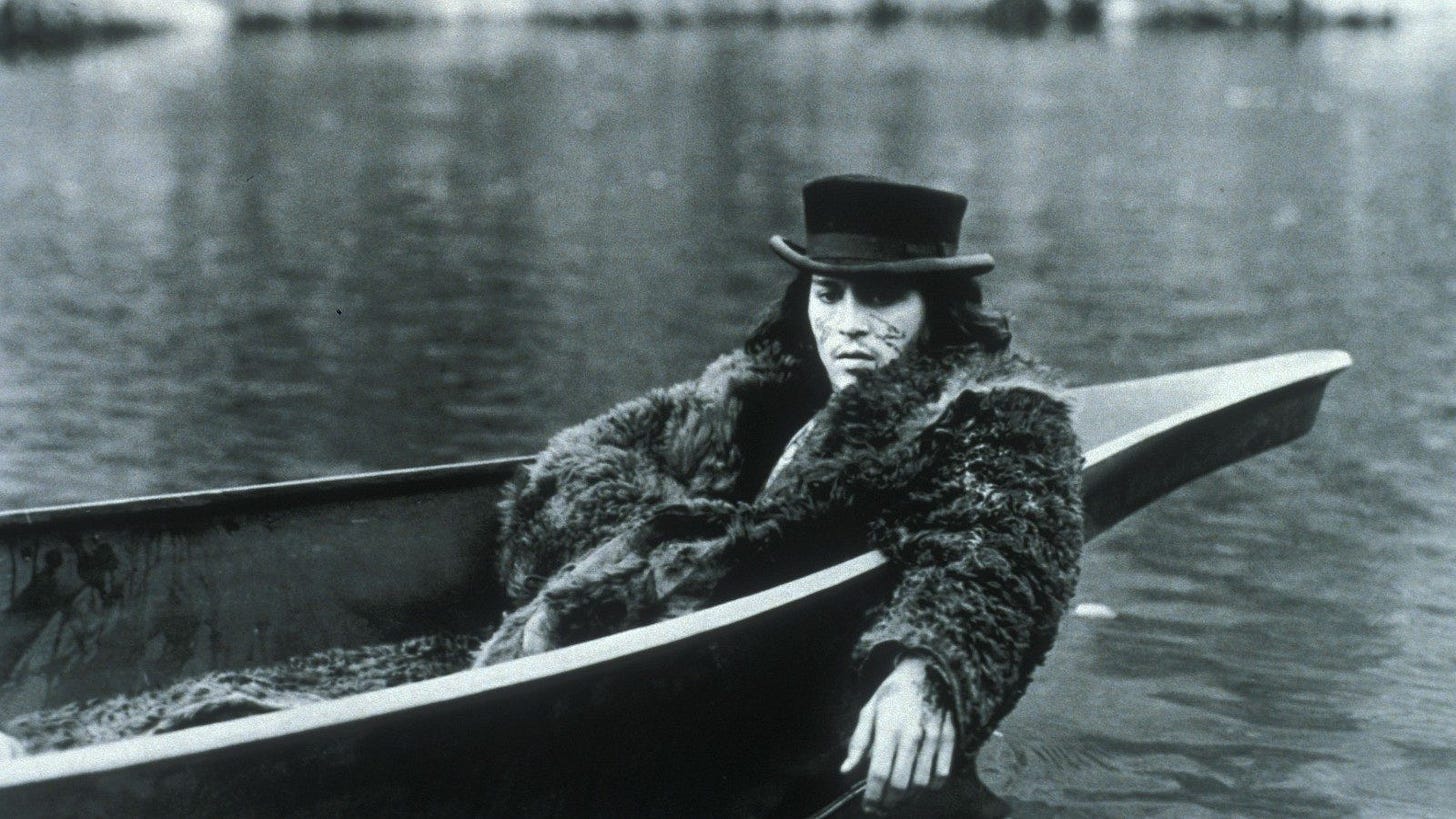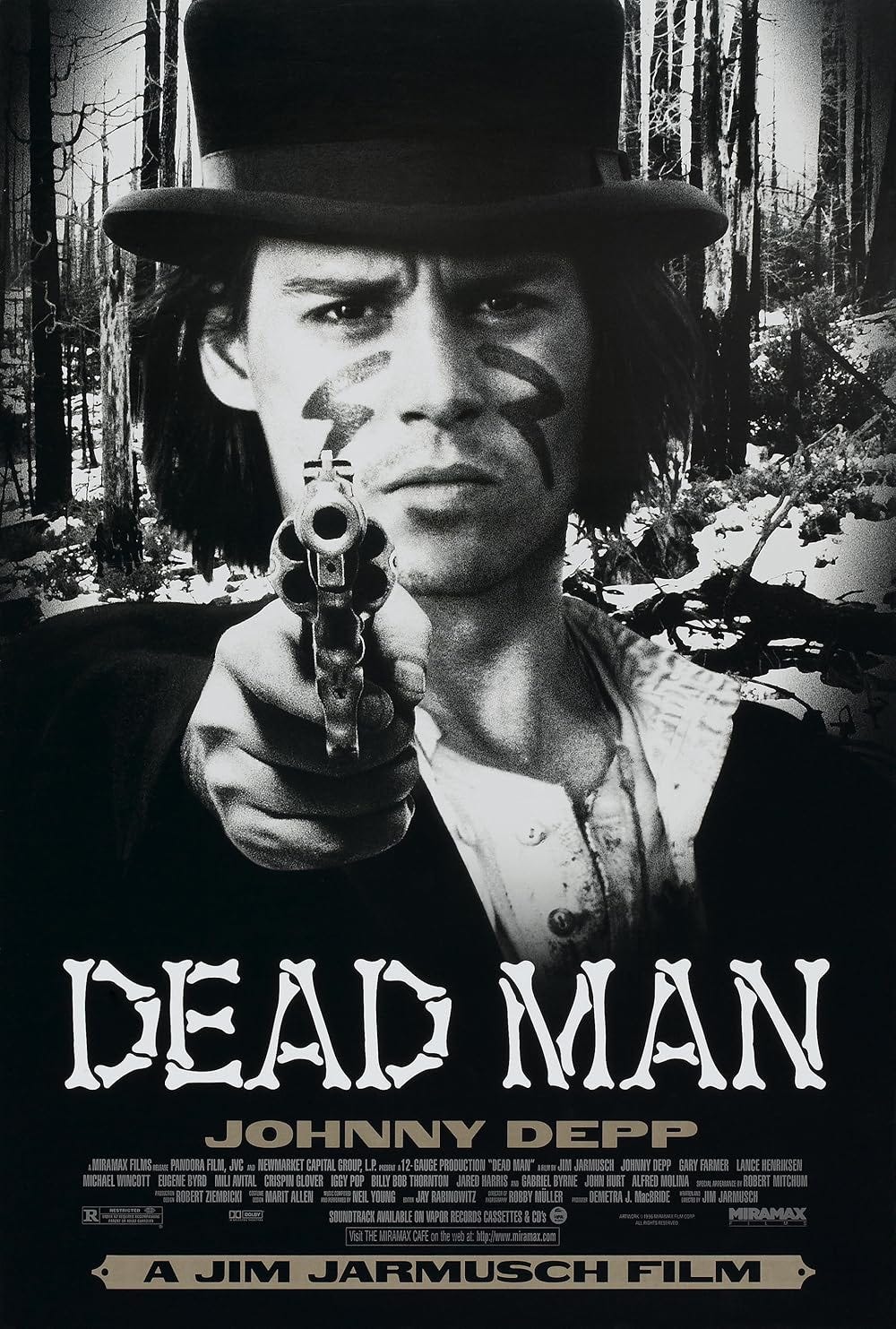Dead Man (1995) is an Ensemble Acid Trip Into the Wild West
Guest post alert! Today’s newsletter was written by my comrade Ted Kendrick, who made his Dust On The VCR debut almost a year ago with an excellent deep dive into Batman: Mask of the Phantasm. We just call him “Mr. December” around here. If you don’t know Ted, he’s a big part of the film scene here in Birmingham; in fact, he’s currently working in the production office for a feature film that’s shooting locally. When he’s not on set, Ted stays busy writing reviews for Comic Book Resources, so all you comic fans go check out what he’s cooking up over there—and at his home base, TedKendrick.com. But first, read what he has to say about a film by a director who will never make a comic book adaptation. Take it away, Ted!
Jim Jarmusch is well known as a nonconformist when it comes to traditional genres. He described Dead Man as a comic, existential American trip, and he’s not wrong. It’s a surreal pilgrimage across the extreme environment of the Wild West that leans into Jarmusch’s signature dark sense of humor. But if a genre must be defined, Dead Man lands in the subcategory of “acid Western,” which typically incorporates elements of peyote visions and LSD into standard Western fare. The film is essentially a vision quest shared between two unlikely friends in an inhospitable world.
William Blake (played by Johnny Depp) is the wrong man in the wrong place with the right name. He’s not the historic poet and painter, but rather an accountant who used his last bit of cash to take a train to the town of Machine only to find that his promised job has already been filled. Though he begins as a timid traveler on a train, circumstances push Blake into the persona of a ruthless killer, compelling him to embrace the newfound artistry of his existence. His pen becomes a gun; his poetry is blood. He leaves behind a wake of seventeen bodies overall as the wanted posters increase the offered reward bounty accordingly while his health slowly deteriorates in a saunter toward a certain end.
When Blake gets into trouble early on and winds up with a bullet is lodged into his chest, a Native American who calls himself Nobody (played by Gary Farmer) finds Blake and attempts to treat his wounds.* Nobody is led to believe that Depp is the actual poet William Blake, whose works Nobody has read and enjoyed. As a boy, Nobody was captured by settlers and taken to England as a sideshow attraction, but he later received an education there. His penchant for sharing the philosophies he learned abroad earned him the name Xebeche, which means “He Who Talks Loud, Saying Nothing.”**
Farmer delivers a standout performance as Nobody, who provides the heart and moral center to an otherwise dismal fairy tale. In my humble opinion, Nobody serves as Blake’s guardian angel to accompany him through purgatory, hoping that Blake may hold off death long enough to acquire the necessary sacrament to atone his spirit and pass with honor (which is tobacco in this case). Dead Man generally succeeds in its portrayal of Native Americans, especially from the perspective of a white director. Several conversations spoken in Cree and Blackfoot are intentionally untranslated and without subtitles to serve as inside jokes for viewers of those nations. The Nobody character also manages to avoid stereotypes, portrayed as neither a threat to settlers nor a wise shaman but a complicated character with his own virtues and faults.***
Whenever Jarmusch takes on a new project, he doesn’t just cast a star or two. I believe he considers every project a vehicle to work and play with his best friends. Filmmaking is a fun time, so you might as well surround yourself with your pals, right? That’s exactly what he did with Dead Man.
Crispin Glover sets the strange tone as a coal-covered train fireman who first introduces Blake, though his part in the film is over before the opening credits even roll. Legendary action antihero Robert Mitchum makes his final film appearance, delivering a bellowing performance as the trigger-happy businessman John Dickinson, who hires three bounty hunters to retrieve Blake in the wake of his son’s murder. Those bounty hunters—played by Lance Henriksen, Michael Wincott, and Eugene Byrd—range from a man rumored to have killed and eaten his own parents to a man who sleeps with a teddy bear at night, and they’re nothing short of hilarious.**** There’s even a scene where Blake and Nobody wander into a precarious situation with three Bible-quoting, bean-eating travelers played by Jared Harris, Billy Bob Thornton, and legendary Stooges frontman Iggy Pop.
Jarmusch and his friends had plenty of fun behind the camera as well. Cinematographer Robby Müller shot the film in stark black-and-white to evoke the historical nature of the 19th century setting, taking heavy influence from the legendary landscape photography of Ansel Adams. And Neil Young composed an original soundtrack for the film in pure improvisation.***** Young’s masterful control over the chaotic distortion delivers an incomparable guitar performance that singlehandedly satisfies the price of admission.
There’s a line from the poet William Blake’s Auguries of Innocence often quoted in the film: “Some are born to sweet delight. Some are born to endless night.” This could describe a dichotomy of viewer experiences with Dead Man. It’s a story that reminds us that the world is cruel, life is fragile, chaos interferes with the best-laid plans, and displays of great care and sacrifice too often go unrequited and unrewarded. The film is challenging in its hesitancy to issue any definitive statements, but Jarmusch straddles this unique tone with poise. Whenever a character speaks, they must be taken at their word; as bleak as Dead Man can be at times, nobody is ever painted as a liar.
With this in mind, I understand why some may see Dead Man as nothing but an endless night that will never reach the credits, especially given the intentionally slow pacing. But it’s one of my personal favorites, and I consider it to be a sweet delight indeed.
*The name Nobody harkens back to its own literary roots. In Homer’s The Odyssey, Odysseus says his name is Nobody before he fights a cyclops. When the cyclops is asked to share the name of the man who beat him, he can only say “Nobody did.”
**This is a reference to James Brown’s song “Talkin’ Loud and Sayin’ Nothing.”
***In Jarmusch’s 1999 film Ghost Dog: The Way of the Samurai, Farmer cameos as a reincarnation of Nobody. He even recycles his signature line from Dead Man: “Stupid fuckin’ white man!”
****While the film is set in the late 1800s, the first teddy bear actually wasn’t sold until 1903, named in dedication to President Theodore Roosevelt, who famously refused to shoot a bear during a hunting trip in Mississippi.
*****The Criterion Collection disc features a Hi8 video of one of Neil Young’s recording sessions captured by Jarmusch himself.
Dead Man is currently streaming on Max and the Criterion Channel, and it is available for rent elsewhere.





After this, I feel like I should give this one another go. Watched it too young and stupid, and Neil Young's grinding guitar wore on my nerves a bit. But this is a hell of a write-up.
"You're like a dull knife that won't stop cutting/You're just talking loud and saying nothing."